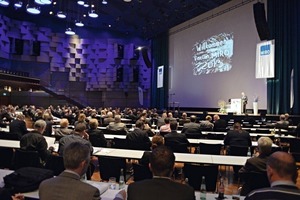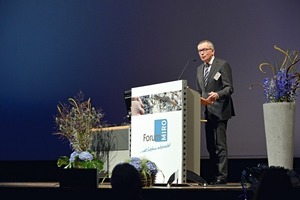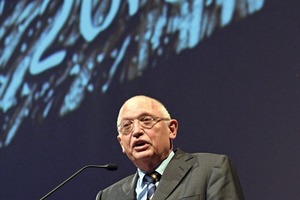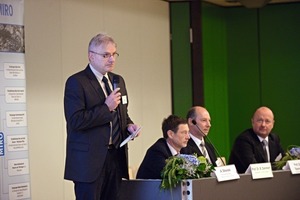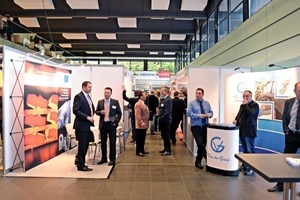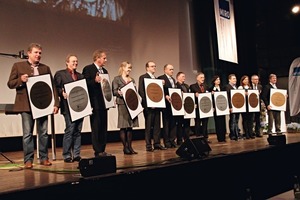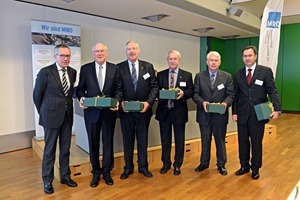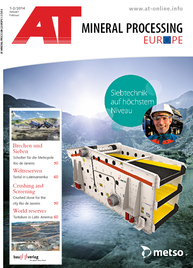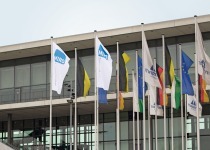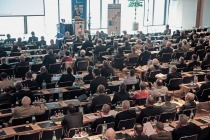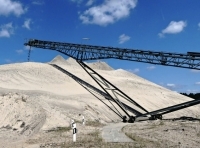“Because the substance is decisive”
The 5th ForumMIRO took place at the Eurogress in Aachen from 6 to 8 November 2013. This time the organizing Federal Association of Mineral Raw Materials (MIRO) welcomed more than 450 participants (Fig. 1) and 60 exhibitors at the leading event of the German rock industry. Those responsible took stock of the overall situation and gave lectures on the economic prospects of the sector within the framework of the general meeting, but also during the opening of the event (Fig. 2).
Any efforts to make the extraction and production of rock building materials in Germany as unattractive as possible and, consequently, to stem them, do not change the fact that the German building industry needs large amounts of rock for its construction measures year after year. Even in the rather weak year of construction 2012, the customers needed approx. 235 million tons (-7.1 % compared to 2011) of gravel and sand as well as 211 million tons (-7.8 % compared to 2011) of natural stone, which were produced correspondingly. About 10.1 million tons of quartz pebbles and sand have to be added, which were needed predominantly by other industries (steel producing and processing industry, glass and ceramics industry, chemistry, paint industry and many others). The German rock industry, which in 2012 was represented by 2235 gravel and sand works or extraction points and 910 quarries, supplied these amounts mainly in the quality needed and, consequently, in an environmentally friendly manner.
However, if the capacity to act were to be taken away from the German rock industry due to economic or regulatory straitjackets, this could have unforeseeable consequences for the overall construction activities in Germany, which first of all would lead to a construction tremendously increasing in price due to the imports then required and the clearly increasing costs of transportation. In this case, political perceptions regularly play the trump card of recycling. However, based on the pure facts, this would under no circumstances lead to a victorious outcome.
Peter Nüdling, the President of MIRO, underlined: “This rating of the utilization of mineral construction waste materials and other usable mineral residual products is obviously overrated by politics. Already now their recycling ratio in Germany amounts to more than 90 %. Nevertheless, this will only meet about 12 % of the overall requirement of building materials.” And the issue of availability has to be added. “Only demolished building materials will actually be a possible source of mineral secondary building materials”, Nüdling explained. His statement is confirmed by the current survey of the initiative of the construction recycling management, KWTB, which reveals that about 65 million tons of recycled building materials could be obtained from the available and usable amounts in 2010. Therefore, the remaining material requirement not to be met by recycling secondary building materials is about eight times this amount. This fact clearly shows that the extraction of mineral raw materials is inevitable.
Altogether, the mood in the building materials industry has clearly improved since the end of 2012. The interviewed companies evaluate the business situation rather favourably at the moment and for the next six months. This is justified because the general overall economic conditions for the year 2014 are currently developing remarkably well.
The slogan of the Federal German Association of Rock Producers “…because the substance is decisive!” was also the motto of the ForumMIRO 2013. It strongly reflects the demand of the companies in the association. They supply mineral raw materials to customers according to demand, punctually and of a good quality. The companies in the German rock industry need reliability as regards the securing of raw material and the general legal conditions of their activities to ensure their ability to supply now and in the future. At present both cannot be realized in many cases. Instead the producers of the absolutely necessary rock building materials receive signals that the latter do not fit into the picture of sustainability, which is erroneously defined as the complete abstention from natural, non-renewable raw materials. Amongst other things, these developments were presented and discussed in the workshops at the ForumMIRO 2013.
Based on its experience, the sector generally confirms that German and European politics are considerably hostile to the industry. That was also confirmed during the forum by Prof. Günter Verheugen who is an acknowledged expert on European politics. He himself was an industry and company policy commissioner of the EU as well as vice president of the commission from 2004 till 2010. Since 2010 he is honorary professor at the European University Viadrina in Frankfurt (on the Oder). He gave the ceremonial lecture at the ForumMIRO (Fig. 3).
Verheugen evaluated the present rating of the industrial policy in the European administration moloch as eroded. Until a few years ago, the sound economic development of the manufacturing industry had played a role in European politics. In the meantime it has become climate policy to the power of three, mainly driven by Germany. As he sees it, the efficiency goals of the resource policy overshoot by far the given possibilities so that they slow down sound economic development instead of promoting it. From the economic policy point of view it is pure poison and competitive-distorting to artificially bombard these goals with an additional raw material tax that jeopardizes the competitiveness of a whole branch. Verheugen’s statement was exactly how the participants of the conference felt about this. In the end the rock sector does not serve the preservation of its own survival, but an urgent demand that, by the way, is controlled mainly by the public authorities. Nevertheless, sometimes there is the impression that the extraction of raw materials is considered as something highly “forbidden” in Brussels circles. “Europe is and remains a real opportunity for the future. However, only if we make the best out of what we have as nations”, is the position Verheugen, the convinced European.
In spite of all difficulties, as always, the ForumMIRO also looked to the future. A panel discussion dealt intensively with the question of how to recruit junior staff because the rock industry has to represent its advantages in a better way in the increasing competition with allegedly more attractive employers. Training in the typical professions of the rock and associated products industry is currently not at the top of the wish list of young people. Nevertheless, the job profiles, in particular for well-grounded young people are exciting and varied. The work environment offers individual possibilities to develop in the responsibility ranking. As a result of this event, MIRO will define and prioritize the need for information and act accordingly together with the state associations and the industry-wide training centres.
To continue acting with foresight is also the motto in the technical field regarding the development of machinery and equipment. The focus of the corresponding lectures of the workshop on the topic “Innovative Technology” was on a newly developed online analysis method, on further developments of crushing and screening technology as well as on effective possibilities to prevent cable thefts. Further topics in the workshop were, amongst other things, future raw material securing, the future of the Mining Code (Fig. 4), possibilities for corporate financing, the goals and problems of the Federal Compensation Regulation, the cost factor ‘energy’ with a view to possible saving potentials as well as the objective and positive handling of the resistance of concerned citizens to necessary expansion permits for extraction projects.
The high-quality range of the knowledge offered and the problems discussed during the ForumMIRO once again underlined the importance of a functioning and, above all, effective and lively association. The selected topics reflected an important part of the range of activities of MIRO and, together with the fringe events, offered an attractive communication platform. The great variety of discussions and the exchange of views (Fig. 5) during the event again gave important impetus and stimulation for the work of the MIRO committees. It is particularly the bilateral communication that shows the most urgent problems in everyday practice requiring appropriate solutions.
On the morning of 7. November 2013, the winners of the MIRO labour safety competition were awarded within the framework of the opening ceremony (Fig. 6). This time about 300 companies took part in this competition. The annual accident statistics combined with the labour safety competition is the “measuring instrument” for this award, which additionally is a motivation factor and serves as a support for those responsible for labour safety at the companies.
All the prizewinners awarded worked hard for their success with care and attention. A calculated safety index is relevant for the labour safety competition. It compares the number of working hours with the accidents which occurred. If there was no accident at all, the number of working hours is transferred to the next calendar year as hours without accidents and is credited to the company. Thus, minor member companies, which frequently work without any accident for years, also have a chance to be included in the award, thus eliminating lucky coincidence. Every year six certificates are awarded separately according to natural stone as well as gravel/sand (1 x in gold, 2 x in silver and 3 x in bronze). In addition to these six prizewinners, member companies which did not have any accident for three, five or seven years also receive an award. In particular minor member companies should thus be awarded for special performances and motivated to take part in the competition. It is particularly such companies which frequently work without any accident for years, but they are hardly ever medallists due to the very low number of hours. Nevertheless, these companies have a high level of labour safety that can be acknowledged publicly in that way.
During the evening event on 7 November 2013 in the Coronation Hall of the Aachen town hall Peter Nüdling honoured the retiring members of the board Michael Schulz, Heiko Dallmann, Werner Schmeer, Elmar Kirchhoff and Dr. Paul Páez-Maletz (Fig. 7) and thanked them for their active participation in shaping the history of the association. Furthermore, Michael Schulz was appointed honorary member of the MIRO chair in recognition of his special services concerning the German rock industry.
Since MIRO will support steinexpo in Nieder-Ofleiden from 3. to 6. September 2014 as the major event of the sector this year, the next ForumMIRO will take place in autumn 2015. The location and date will be announced in due time.

